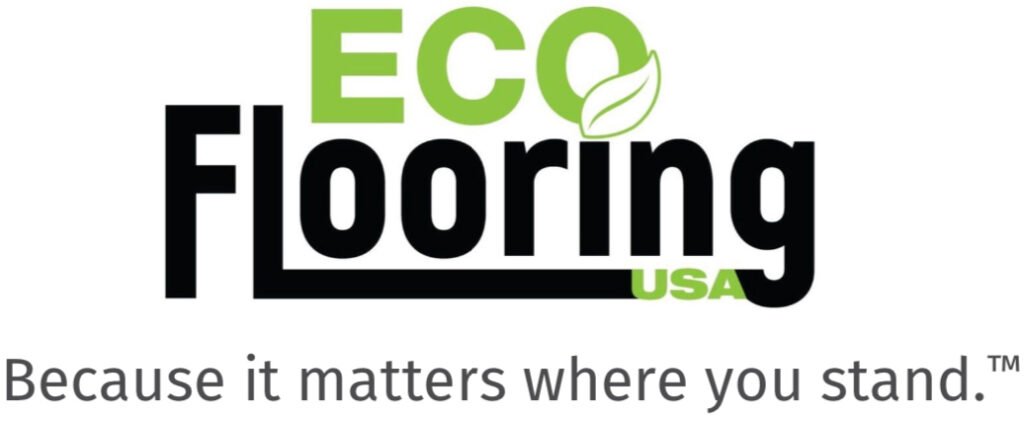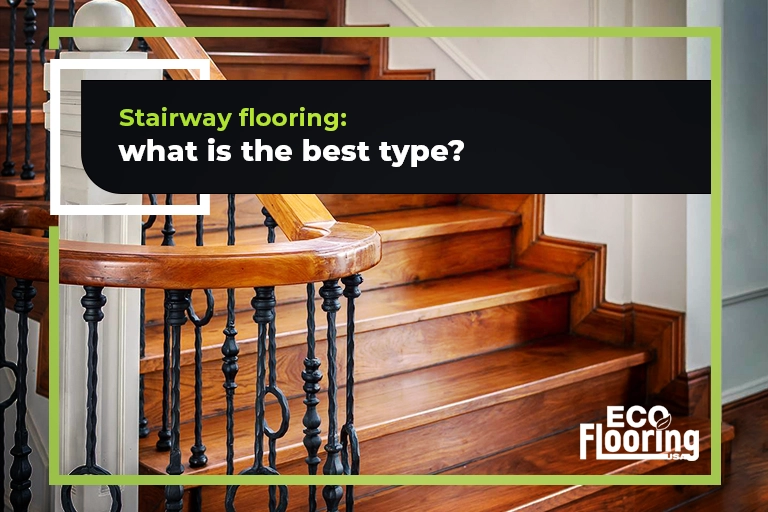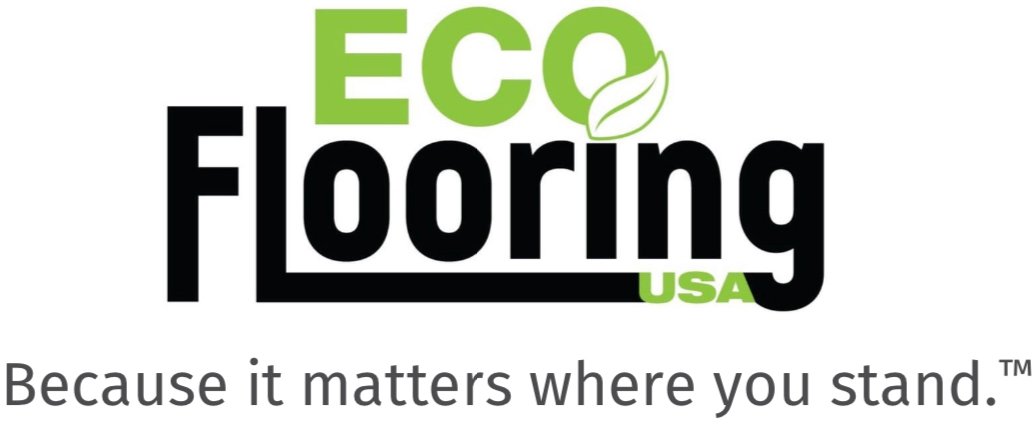Stairway flooring is a crucial aspect of a home’s design, with the combination of functionality and aesthetic appeal being essential.
When choosing the best type of flooring for your stairs, several factors should be considered, including durability, safety and style.
Therefore, Eco Flooring USA has prepared this guide to help you choose the best flooring for the stairs in your home.
Keep reading!
What to consider when choosing the stairway flooring?
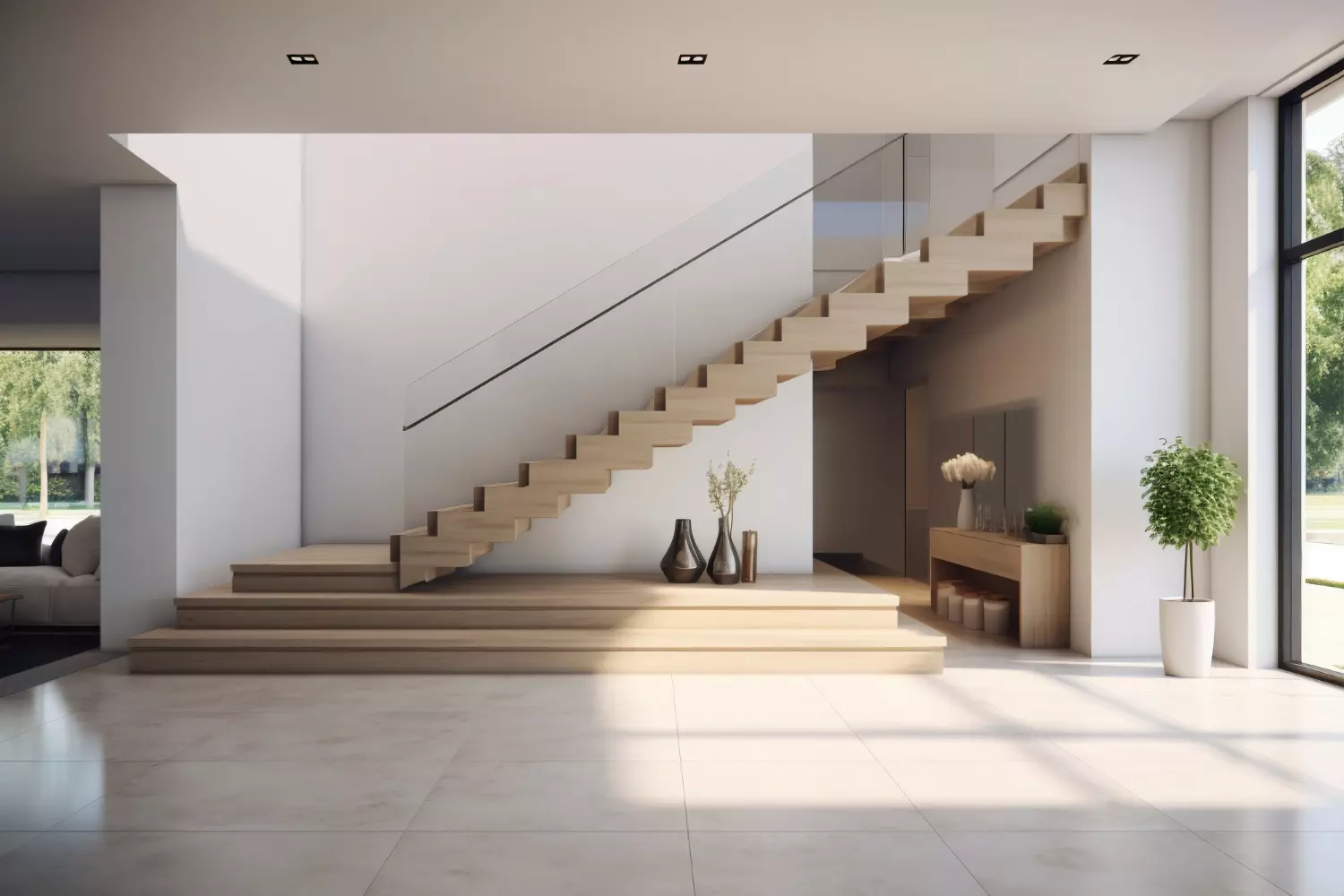
When choosing the ideal flooring for stairway, the main factors to consider are:
- Safety: Safety should be a priority when choosing stairs flooring. Look for materials that offer non-slip surfaces to minimize the risk of accidents, especially in homes with children and the elderly.
- Durability: Choose materials that can resist wear and tear over time, without showing significant signs of damage or deterioration.
- Style: Stairs are an eye-catcher in a home, so it’s important to choose a floor that complements your overall interior design aesthetic. Whether you prefer the elegance of wood or the versatility of laminate, select a style that aligns with your personal taste.
- Maintenance: Consider the level of maintenance required to keep your stairs looking its best. While some materials may only need regular sweeping and occasional cleaning, others may require more intensive care and maintenance to maintain their appearance and functionality.
- Cost: Evaluate the cost of materials, installation, and long-term maintenance to determine the most economical option that meets your needs without compromising quality or safety.
Stairway flooring comparison table: Hardwood, Laminate, LVP
Here’s a comparative table of the best types of flooring for stairs:
| Aspect | Hardwood | Laminate | LVP |
| Safety | Generally safe | Can be slippery | Slip-resistant, water-resistant |
| Durability | Highly durable, prone to scratches and dents | Resistant to scratches, stains, and fading, susceptible to moisture | Highly durable, resistant to scratches, stains, and water damage |
| Style | Timeless elegance, natural aesthetic | Mimics hardwood, stone, or tile | Realistic wood and stone patterns |
| Maintenance | Requires regular care and refinishing | Easy to clean, avoid moisture | Low-maintenance, regular sweeping and occasional mopping |
| Cost | Most expensive | More affordable than hardwood | Budget-friendly option |
Each type of flooring has its own particularities and the choice must be made considering your personal needs and key aspects of your home.
Know more about each one!
Hardwood Stairway Flooring
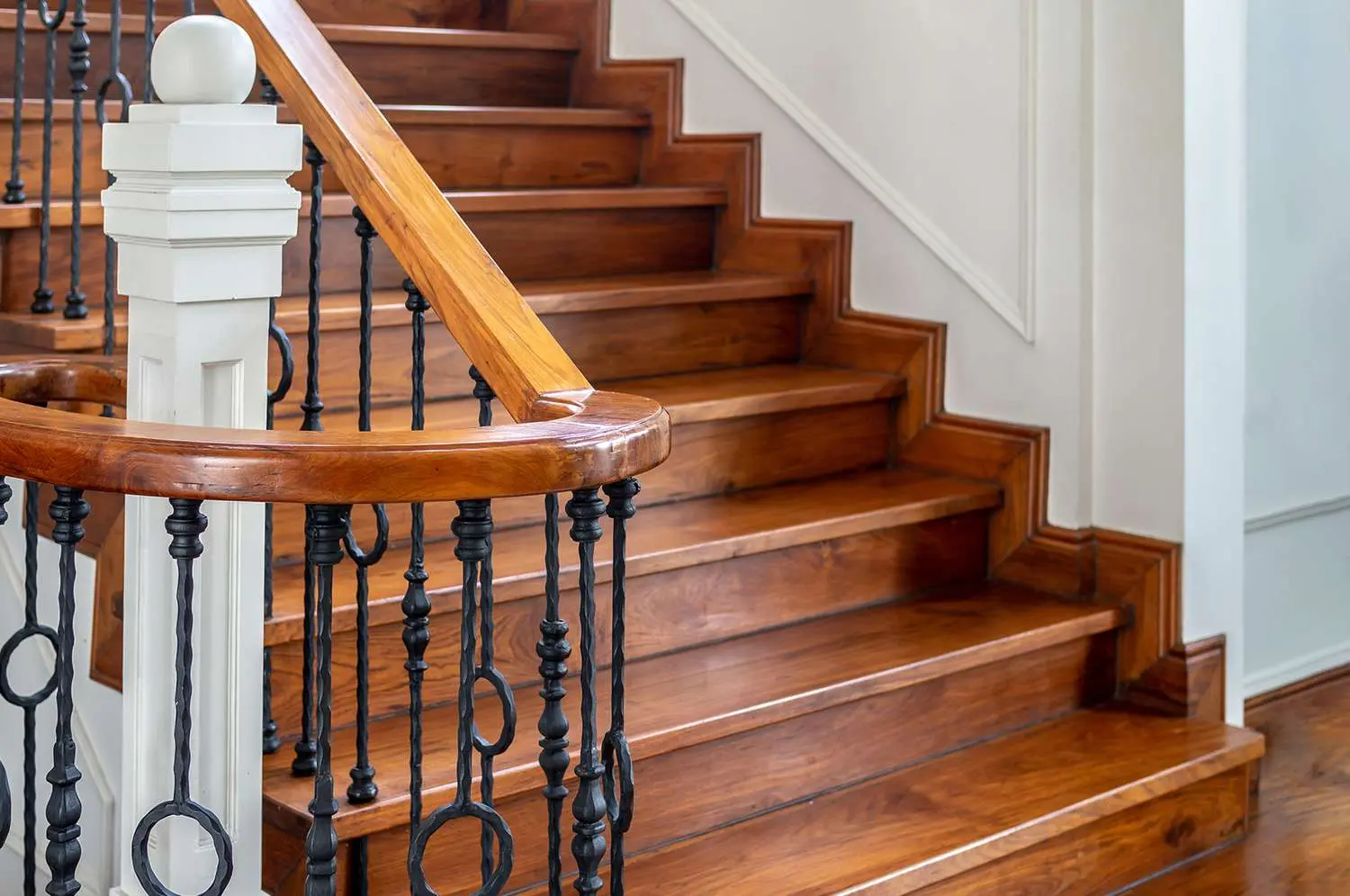
Essentially, hardwood flooring is made from solid wood, typically harvested from trees such as oak, maple, cherry or walnut.
One of the defining characteristics of hardwood flooring is its natural beauty and warmth. Each plank features unique wood grain patterns, knots and textures, adding a touch of authenticity and charm to any space.
In addition to its aesthetic appeal, this type of flooring is valued for its durability and longevity. When cared for properly, they can last for generations, withstanding the wear and tear of daily life with resilience.
Benefits of Hardwood for Stairways
- Timeless aesthetic: Hardwood exudes timeless elegance, enhancing any home with its natural beauty. Its classic appeal adds sophistication to any interior design scheme.
- Durability: Known for its resilience, hardwood withstands daily traffic on stairs. Its solid construction ensures long-term reliability, ideal for busy families.
- Easy to clean: Maintaining hardwood stairs is very easy. Regular sweeping and occasional mopping are enough to keep the surface clean and spotless, saving you time and effort.
- Adds value to the home: Considered a valuable investment, hardwood increases the resale value of a home. Its timeless appeal and durability make it attractive to potential buyers while increasing overall desirability.
- Allergy-friendly: Unlike carpets, for example, hardwood provides a hypoallergenic surface that promotes better indoor air quality. This is ideal for greater health care for residents.
- Versatile design options: It offers a wide range of species, finishes and colors, allowing homeowners to customize their stairs to suit their personal style and preferences.
Cons of Hardwood for Stairways
- Hard surface: While hardwood offers durability and aesthetic appeal, its firm surface may be uncomfortable for individuals with certain foot conditions or those who prefer a softer feel underfoot.
- May produce noise: Wooden stairs can sometimes produce noise, especially in homes with open floor plans or high ceilings. This noise may include creaking or squeaking, which may be bothersome to some occupants.
- Can be slippery: Its surfaces, especially when polished or waxed, can become slippery, posing a safety risk, especially in homes with children, elderly people or pets.
- Higher initial cost: Compared to other flooring options, hardwood typically has a higher initial cost. However, it is a long-term investment due to its durability.
Laminate Stairway Flooring
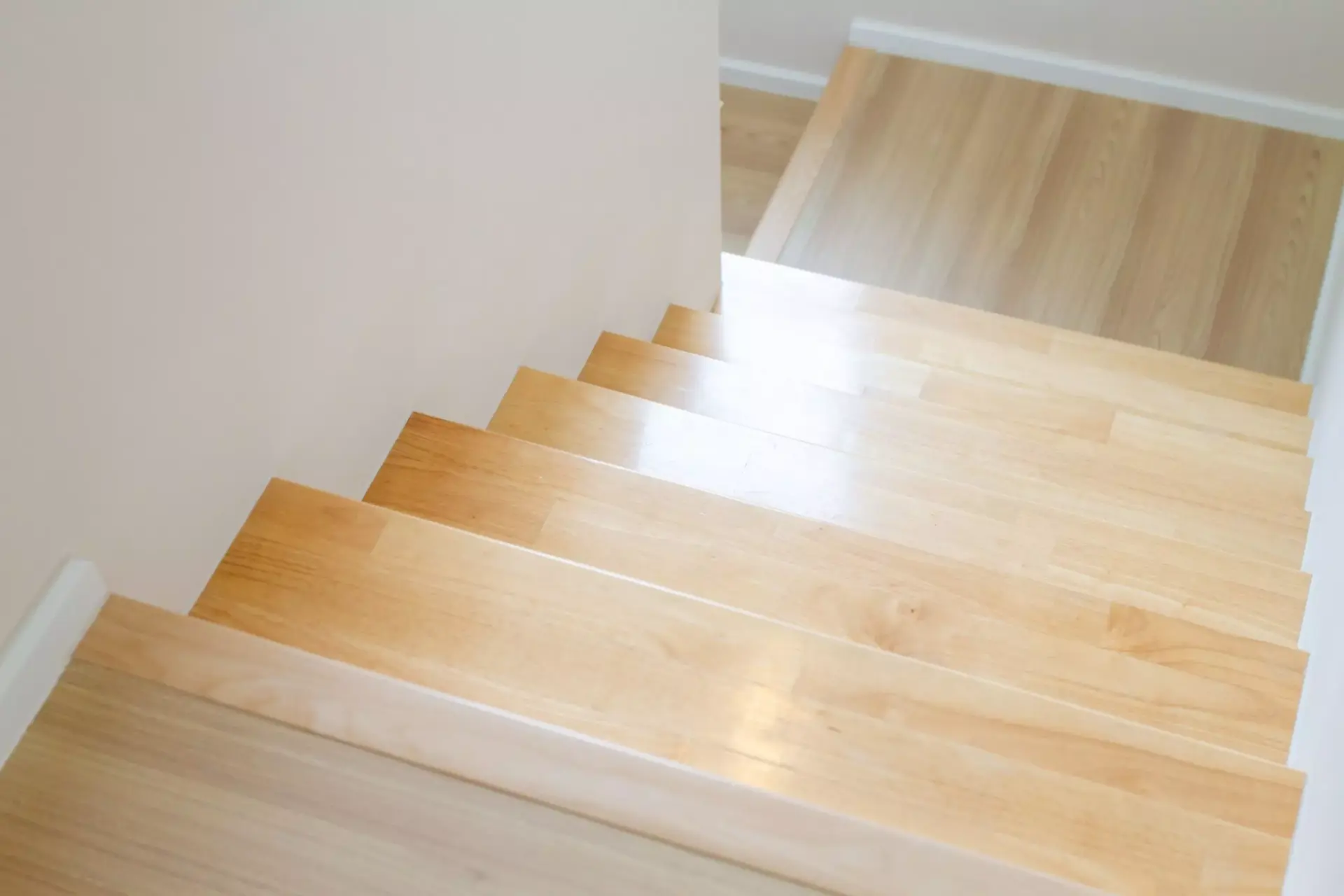
Laminate flooring consists of multiple layers fused together through a lamination process. These layers typically include a wear layer, a decorative layer with a high-resolution image of wood grain or tile, and a core layer made of fiber or other materials.
It offers the look of wood or tile at a more affordable cost, making it an attractive choice for homeowners looking to update their stairs without spending too much.
With its wide range of styles and textures, laminate offers broad design flexibility to suit diverse aesthetic preferences and interior decorating schemes.
In addition to its affordable price and versatility, laminate flooring for stairs is also known for its durability and ease of maintenance. Its scratch-resistant surface and simple cleaning make it a great choice for busy families.
Benefits of Laminate for Stairways
- Affordable: Laminate stairway flooring is a budget-friendly option, allowing homeowners to achieve the look they desire while saving some money.
- Easy to clean: This type of flooring is simple to maintain, requiring only regular sweeping and occasional mopping to keep it looking clean and fresh.
- Durable: It is known for its durability, able to withstand the wear and tear of daily foot traffic on staircases without showing significant signs of damage.
- Wide range of styles: It comes in a wide variety of styles, colors, and patterns, allowing homeowners to choose the perfect option to complement their home’s decor and personal style.
- Resistant to scratches and stains: Laminate stair flooring is highly resistant to scratches, stains, and fading, making it an ideal choice for households with children and pets.
- Low maintenance: With its durable surface and easy-to-clean nature, laminate requires minimal maintenance, saving homeowners time and effort on upkeep.
Cons of Laminate for Stairways
- Prone to chipping: Laminate flooring can be susceptible to chipping at the edges, particularly in high-traffic areas like stairs, which can harm its appearance and longevity.
- Limited repair options: Unlike hardwood flooring, which can be sanded and refinished to repair damage, laminate has limited repair options. Chips and scratches can be difficult to hide or repair perfectly.
- Not as visually appealing as wood: While laminate flooring offers a wide variety of styles and designs, some homeowners may find it lacks the natural warmth and visual appeal of wood, impacting the overall aesthetic of the staircase.
- May have a hollow sound when walked on: Due to its floating floor installation method, it may produce a hollow sound when walked on. This hollow or echoing noise can be more noticeable on staircases and may impact the overall acoustics of the space.
LVP Stairway Flooring
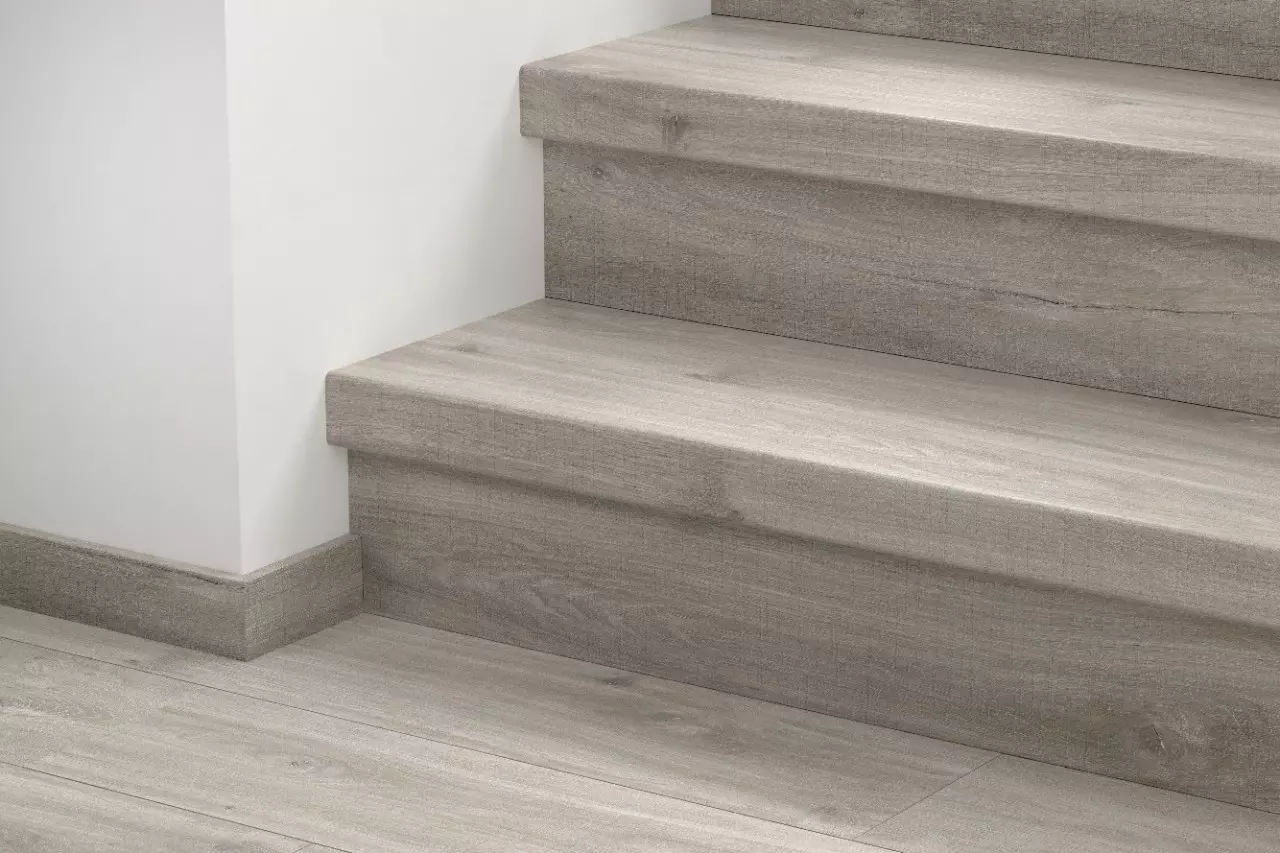
Luxury Vinyl Plank flooring is a synthetic flooring material that replicates the look of natural wood. Unlike traditional vinyl flooring, which comes in sheets, LVP consists of individual planks that closely mimic the look of hardwood planks.
One of the standout features of LVP stair tread is its versatility. It comes in a wide range of colors, textures and finishes, allowing homeowners to achieve the look they want for their stairs, whether it’s rustic oak, elegant walnut or contemporary gray tones.
Additionally, LVP is available in various plank widths and lengths, providing flexibility in design and installation.
Benefits of LVP for Stairways
- Waterproof: LVP is inherently waterproof, making it an ideal flooring option for stairs, especially in areas prone to moisture or spills, such as entryways or kitchens.
- Durable: With its protective wear layer, it withstands heavy foot traffic, making it suitable for frequently used stairs.
- Scratch Resistant: LVP resists scratches and scuffs, maintaining its appearance even in high-traffic areas.
- Easy to clean: It is simple to maintain and clean, requiring only regular sweeps and occasional mops to keep it looking its best.
- Wide Variety of Styles: Available in multiple styles, colors and textures, homeowners can achieve the look they want for their stairs, from classic wood tones to contemporary designs.
- Affordable: Compared to wood or other flooring options, LVP is often more cost-effective, providing homeowners with a cost-effective solution for updating their stairs.
- Comfortable Underfoot: Providing a comfortable surface underfoot, LVP offers a slight cushioning effect that can reduce noise and provide greater comfort when going up and down stairs.
Cons of LVP for Stairways
- Limited repair options: Unlike hardwood flooring that can be sanded and refinished, LVP has limited repair options. Damage such as deep scratches or gouges may require the replacement of the affected plank, which can be challenging and may result in visible seams.
- Slippery when wet: While LVP is water-resistant, it can become slippery when wet. Adding non-slip stair treads or rugs can help mitigate this risk.
- Some types may have a plastic-like feel: Although LVP is designed to mimic the look and feel of hardwood, some types may have a plastic-like feel underfoot, which may not appeal to everyone’s preferences.
Conclusion
In conclusion, selecting the right flooring for your staircase involves weighing several factors such as durability, aesthetics, maintenance and budget.
Eco Flooring USA offers a comprehensive catalog of high-quality Hardwood, Laminate, and Luxury Vinyl Plank Flooring. With a wide range of styles, colors and textures available, homeowners can find the perfect flooring to suit their preferences and complement the aesthetic of their home.
Additionally, Eco Flooring USA offers Staircase Remodeling services to help homeowners transform their stairs into stunning focal points of their home.
Whether you’re looking to replace carpeting, renew worn out wood, or update your staircase with a modern, durable flooring solution, Eco Flooring USA has the experience and resources to bring your vision to life.
